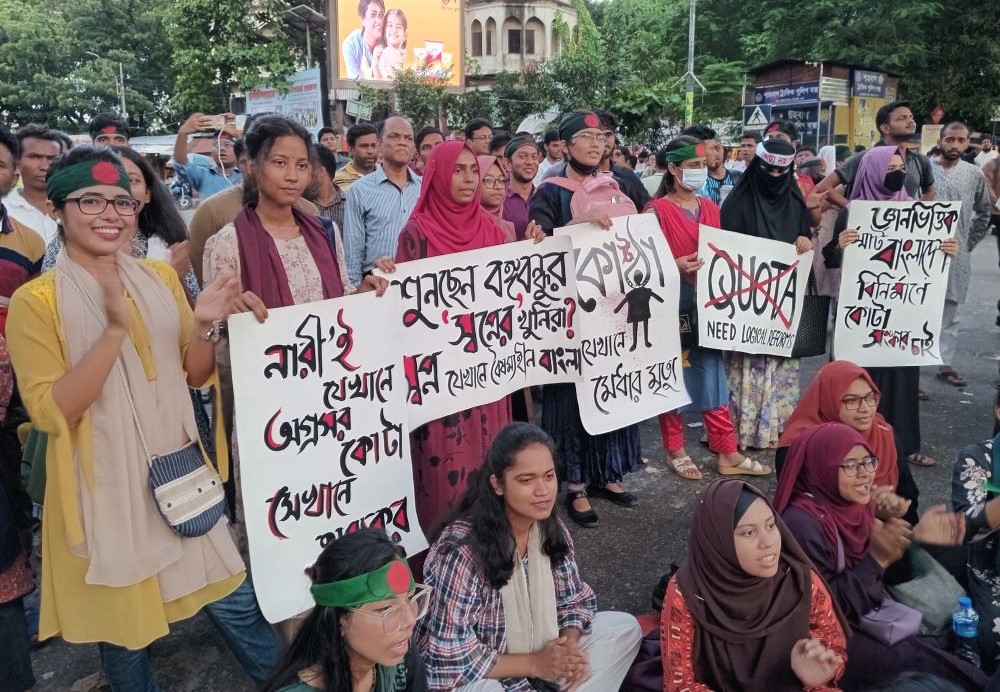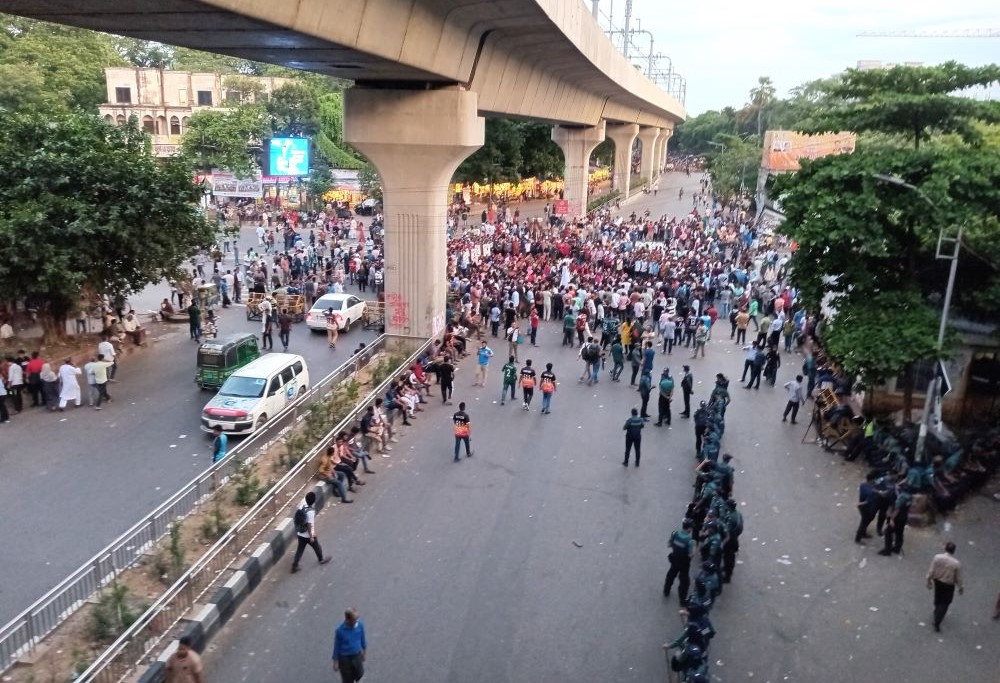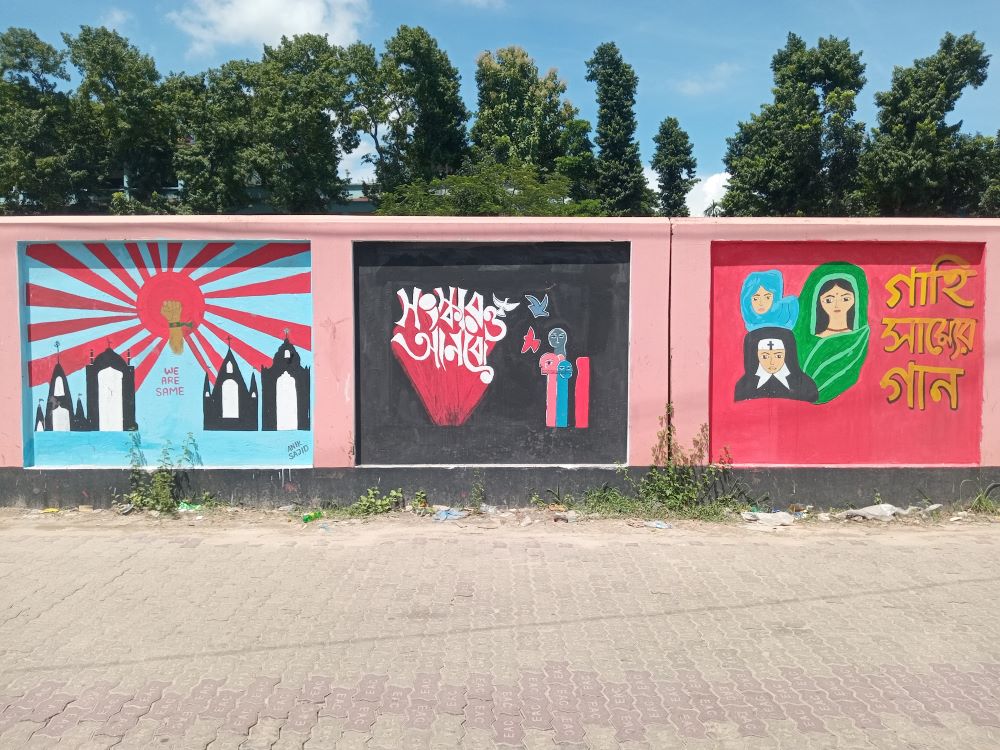
Members of the Anti-Discrimination Student Movement gather in the Shahbagh neighborhood of Dhaka on July 8. The group led protests in July and August that killed more than 700 people. (Sumon Corraya)
Catholic nuns are among educators facing challenges and barriers to running their schools and colleges in parts of Bangladesh after the fall of the Sheikh Hasina government.
At least 708 people have reportedly been killed in violent protests in July and August, according to a Ministry of Health report released Sept. 24. These protests, which began over demands to cancel the government job quota system, evolved into a broader movement against the current government.
Hasina's authoritarian regime ended Aug. 5 in self-imposed exile following a series of student-led violent protests. More than 200 people were killed during the protests, led by the Anti-Discrimination Students Movement.
Following Hasina's resignation, an interim government led by the Muhammad Yunus was formed on Aug. 8. Meanwhile, a vested interest group is causing widespread disruption on campuses across the country, targeting educators at all levels. This group is pressuring vice chancellors, principals, head teachers and faculty members to resign from their positions. In addition to at least 50 forced resignations, some teachers have faced physical assaults, with several being injured and hospitalized after violent attacks. Some say this group is exploiting young students to protect and further their interests, creating a tense situation on educational campuses.
The Christian population numbers 0.3% among 170 million people in this Muslim majority country, with about 450,000 Catholics. The Catholic Church in 2018 ran one university, 12 colleges, 579 secondary and primary schools, and 13 vocational training institutes in the country, according to the Bangladesh Catholic Education Board, or BCEB. Half of those schools are headed by nuns.
"We spoke out against irregularities and crime," student Munmun Akter told GSR. "We want a country where people of all faiths can live together."
Dhaka Archbishop Bejoy Nicephorus D'Cruze is chairman of the Bangladesh Catholic Education Board. (Sumon Corraya)
Dhaka Archbishop Bejoy Nicephurs D'Cruze, chairman of the BCEB, overseeing all Catholic institutions, spoke to GSR about the harassment and persecution of teachers.
"Students began protesting against the Hasina government, and later, others joined them," D'Cruze said. "This eventually led to Hasina stepping down. Chaos erupted in educational institutions with the onset of the new interim government. Many current and former students harbor anger towards their teachers, leading to harassment and insults, which deeply pained me. Unfortunately, such incidents have occurred even in our Catholic schools and colleges."
The principal and vice principal of one school, both sisters, resigned under pressure from students and guardians. The incident stemmed from a case in which a 12-year-old Muslim girl said she was assaulted by two male teachers, one Hindu and one Muslim, on June 9.
Following the incident, the girl's family filed a police report on June 10, leading to the arrest of both accused teachers. The issue gained renewed attention when, after the Hasina government stepped down, students and guardians demanded the removal of the school's principals for the perceived inaction in addressing the case. In response, the local bishop dismissed the two nuns from their positions.
Sr. Lotika Murmu*, one of the principals who resigned, told local media, "The issue was under investigation, and I had been cooperating with the investigative team."
"Students and parents crossed the line," D'Cruze said. "They formed human chains and protested continuously to pressure the nuns into resigning. There is an ongoing lawsuit, and students and parents could have waited for the court's ruling on the matter."
Advertisement
On Aug. 4, at another college run by nuns, some students attempted to enter the closed campus while engaged in a conflict with police and activists from the ruling Bangladesh Awami League. College authorities refused to open the gate. On Aug. 7, some of those students accused the sister-run college of being against the Anti-Discrimination Students Movement, demanding that the principal and several other teachers resign.
An investigation committee found that students had asked a teacher to seek permission from the college authorities to open the gate on Aug. 4, but the teacher did not communicate that request to the principal. The students believed that the principal was also involved in actions against the Anti-Discrimination Students Movement. Subsequently, a Muslim teacher who was accused voluntarily stepped down.
Four sisters have also been named to a list of 100 anti-hijab teachers in educational institutions, announced on Aug. 22 at a gathering at Dhaka University by an organization called "Rights Awareness Students Society."

Members of the Rights Awareness Students Society form a human chain at the foot of a statue memorializing Raju Bhaskarya, who was killed in 1992 while protesting terrorism, at Dhaka University Aug. 22. The group published a list of 100 teachers, including four Catholic sisters, they say oppose female students who wear hijab. (dailybhorerdak.com/Abdur Rahman)
"Our female students wearing hijab are suffering the most discrimination and oppression in educational institutions," said Muhammad Mohiuddin Rahat, a fourth-year student in the criminology department of Dhaka University, and the convenor of the "Rights Awareness Students Society" at the gathering.
"Some teachers are constantly oppressing them in various ways," he said. "They interrupted their classes, exams and harassed them in new ways. We want an end to the oppression of hijab-wearing girls in the current discrimination-free Bangladesh. Therefore, we students will stand by our oppressed sisters and we demand the dismissal and punishment of all the teachers who oppressed students wearing hijab or burqas."
Global Sisters Report reached out to some nuns to discuss the topic, but they declined to comment, citing the sensitivity of the issue and potential threats. A source said that in the past, only about 1% or 2% of girls wore a burqa or hijab, but now more than 10% do.

This wall in Dhaka includes messages from students that say, "We are the same" and that although people in Bangladesh live with different faiths, together they will reform the country. (Sumon Corraya)
"I want to make it clear that we are not anti-burqa or anti-hijab," D'Cruze said. "Our educational institutions have a decent uniform policy that reflects our values. We do not want any discrimination, so all students are expected to wear the same uniform. Our aim is for students to feel that they belong to the same school, like one family. We want to foster harmony and brotherhood among students. We never discourage any girls from wearing the burqa or hijab in our schools and colleges."
D'Cruze also said that teachers are encouraged to refrain from engaging in any political activities on school and college premises, including on social media.
Jyoti F. Gomes, BCEB secretary, told Global Sisters Report that a consultation meeting on Sept. 14 gathered members of the education board, secretaries of eight diocesan education commissions and several head teachers and principals.
"The focus was on addressing the current challenges faced by church-administered educational institutions and neighboring schools," Gomes said. "Among the issues discussed were forced resignations in four institutions, an increase in the use of veils by female students indicating that school uniforms were seen as inappropriate by some Muslim students, and the need for some schools to designate separate prayer rooms for students to use during school hours. The meeting provided a platform for participants to share challenges and explore potential solutions."
Editor's note: No schools have been named in this story to protect the identities of the sisters. Names have also been changed to protect the identity of a sister.
Editor's note: This story has been updated to correct the status of the secretary of the Bangladesh Catholic Education Board.





